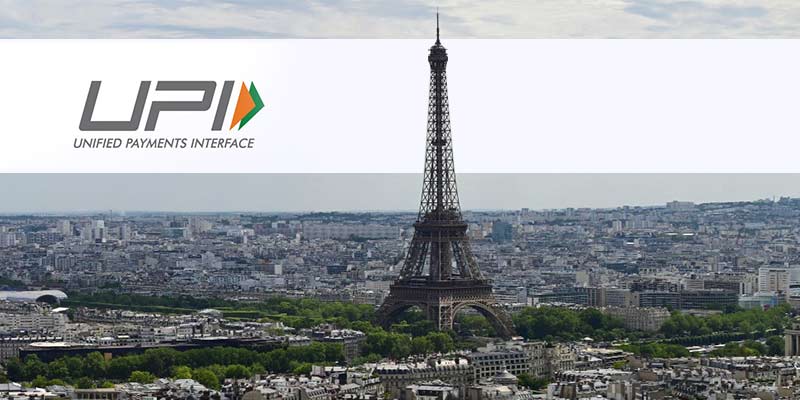- India
- Feb 03
France becomes first European country to accept UPI
• India formally launched Unified Payments Interface (UPI) at the iconic Eiffel Tower in Paris.
• NPCI International Payments (NIPL) has tied up with French e-commerce and proximity payments Lyra, which will help ensure that the UPI payment mechanism is accepted in the European country, starting with the Eiffel Tower.
• Founded in 2001 by Alain Lacour, Lyra secures e-commerce and proximity payments and develops value-added services to manage daily transactions. Based in Toulouse, Lyra is present internationally in 11 countries.
What is the benefit of the tie-up?
• Indian tourists can now book their visit to the Eiffel Tower by purchasing tickets online using UPI — making the transaction process quick, easy, and hassle-free.
• This announcement is of particular significance considering that Indian tourists rank as the second largest group of international visitors to the Eiffel Tower.
• With this development, Indian tourists can make secure online transactions by simply using their UPI powered apps to scan QR code generated on the merchant website and initiate a payment.
• While Eiffel Tower is the first merchant to offer UPI payments in France, this service will soon be extended to other merchants in the tourism and retail space. This will make it significantly easier for touring Indians to remotely book hotels, museum visits, etc for their stay in France.
What is Unified Payments Interface (UPI)?
• Before 2016, India used a number of different systems to transfer money between banks. The traditional forms included National Electronic Funds Transfer (NEFT) and Real-Time Gross Settlement (RTGS). With the plethora of systems, rules and growing paper burden, there was a need for a unified system that could automate and standardise India’s payment platforms.
• In 2016, the National Payments Corporation of India (NPCI) set out with a mandate to change the face of India’s payment systems. It developed the Unified Payments Interface (UPI) as an architecture framework with a set of standard Application Programming Interface (API) specifications to facilitate online payments.
• The aim was to simplify and provide a single interface across all NPCI systems, thereby creating interoperability and a superior customer experience.
• The pilot programme, with 21 member banks, was launched on April 11, 2016.
• The UPI is a system that powers multiple bank accounts into a single mobile application (of any participating bank), merging several banking features, seamless fund routing and merchant payments into one hood.
• It also caters to the “peer to peer” collect request which can be scheduled and paid as per requirement and convenience.
• It facilitates immediate money transfer through mobile devices round the clock.
Growth of UPI
• UPI transactions have experienced substantial growth, surging from Rs 92 crore in FY 2017-18 to Rs 8,375 crore in FY 2022-23, boasting a remarkable Compound Annual Growth Rate (CAGR) of 147 per cent in terms of volume.
• The value of UPI transactions has risen from Rs 1 lakh crore in FY 2017-18 to Rs 139 lakh crore in FY 2022-23, exhibiting a CAGR of 168 per cent.
• UPI emerges as the major driving force in the overall growth of digital payment transactions in the country accounting for 62 per cent of digital payment transactions in FY 2022-23.
National Payments Corporation of India
• National Payments Corporation of India (NPCI) was incorporated in 2008 as an umbrella organisation for operating retail payments and settlement systems in India.
• It is an initiative of the Reserve Bank of India (RBI) and Indian Banks’ Association (IBA) under the provisions of the Payment and Settlement Systems Act, 2007, for creating a robust Payment & Settlement Infrastructure in India.
• Considering the utility nature of the objects of NPCI, it has been incorporated as a “Not for Profit” company, with an intention to provide infrastructure to the entire banking system in India for physical as well as electronic payment and settlement systems.
• The company is focused on bringing innovations in the retail payment systems through the use of technology for achieving greater efficiency in operations and widening the reach of payment systems.
• NPCI is focused on bringing innovations in the retail payment systems through the use of technology and is working to transform India into a digital economy. It is facilitating secure payment solutions with nationwide accessibility at minimal cost in furtherance of India’s aspiration to be a fully digital society.
NPCI International Payments Limited (NIPL)
• NPCI International Payments Limited (NIPL) was incorporated on April 3, 2020, as a wholly-owned subsidiary of National Payments Corporation of India (NPCI).
• As the international arm of NPCI, the NIPL is devoted for deployment of NPCI’s indigenous, successful Real-Time Payment System – Unified Payments Interface (UPI) and Card Scheme – RuPay, outside of India.
• NIPL is focused on transforming payments across the globe with the use of technology and innovation. It will not only enable payment for Indians but also uplift other countries by enhancing their payment capabilities through technological assistance, consulting, and infrastructure.
Manorama Yearbook app is now available on Google Play Store and iOS App Store


